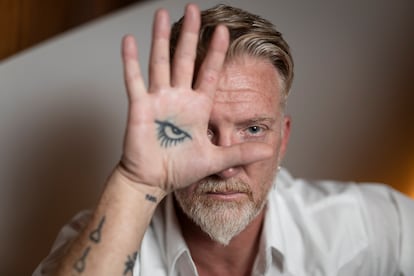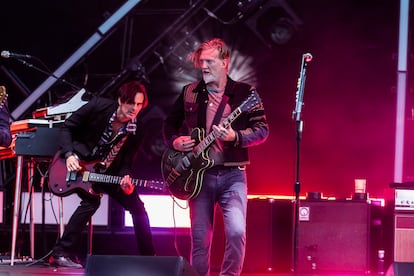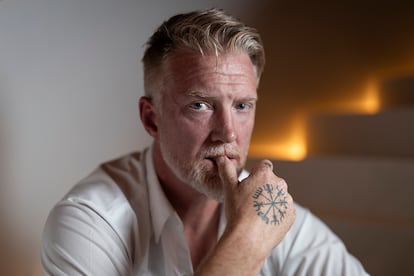Josh Homme, Queens of the Stone Age founder: The fragility of a tough guy
The musician went through ‘five hellish years’ that led to the creation of ‘In Times New Roman,’ but the album’s European tour has been put on hold by an emergency operation after which he continues to be under medical supervision


He’s a tough guy, but also, a small universe of varying sensibilities who carries around a notebook in which he writes more poems than songs. “I write poems, but I don’t consider myself a poet,” he says, taking a sip from his beer. It’s the afternoon of June 26, the day his band, Queens of the Stone Age, ended its packed Spanish tour — five cities in just a week: A Coruña, Madrid, Vitoria, Fuengirola and Barcelona — and Josh Homme (Palm Springs, 51 years old) is euphorically calm. No one could have imagined that 15 days later, on July 10, Homme would undergo emergency surgery, nor that today, he would remain under medical supervision, his status unknown beyond the fact that, for the moment, getting back on stage is not an option. The rest of the concerts on the European tour have been dropping one by one to cancellation.
That day, on June 26, he said he was happy and peaceful. He also said that the tour on which he had embarked was a victory lap because “the last five years have been hellish.” “But we survived,” he also said. Homme had revealed not too long before, during that same June, that last year he had undergone an operation to treat cancer, though what kind of cancer, he had declined to reveal. The only thing we knew about it was what he told us: that the operation had been a success and everything was going well. Perhaps it was because of this, on that afternoon in June, that he seemed so euphorically calm. He spoke a lot about Spain. He said that Spain was, by far, his favorite country in the world. “I feel at home, and at the same time, very fortunate whenever I am here. There is something about the landscape, in the interior, that reminds me of my home. And then there’s everything else. It’s paradise,” he said.

He truly meant it. He’d like to live here. The problem is that his family is huge. “I live with my parents and my three children. Actually, we all live less than five minutes from each other. There’s also my brother and his husband. I would want to see them all here,” he said. And when he said “here,” he was referring to Llafranch, or somewhere similar on the Costa Brava, where “15 or 17 years ago” he spent 10 days with the band “and their families” and he felt time stand still. There is something dreamy in Homme’s gaze when he’s not holding a guitar — on stage, there is no one more swarthily rock ‘n’ roll than him and his band — and it has something to do with a new and unexpected beginning, one that has now been put into doubt, after those five hellish years. The years in which his marriage stalled out, that saw the death of Mark Lanegan (a dear friend and former member of Queens of the Stone Age) and Taylor Hawkins, the Foo Fighters drummer with whom he was also close.
Homme, wearing sunglasses, a white t-shirt, lightly gelled hair, was pleasantly perfumed and calm, above all, calm, and he preferred not to talk about his altercations: the three years of summary probation and community service to which he was sentenced after a bar fight with Blag Dahlia, a friend of Nick Oliveri, a former member of the band. He did talk about In New Times Roman, his latest album — the group’s eighth, the final installment in a trilogy that started in 2013 with Like Clockwork — saying that, as with any good album, “it must reflect what you felt at the moment you were composing it; ultimately, that is what albums are, a moment, a few years of your life.” That yes, it is a return to the roots of powerful, unflappable, pure and today, forbidden, nearly impossible rock, but that it’s also all that he has managed to decode, thus far, regarding his own self. “I see music as a path. Art itself is a path. All we do is walk it,” he said.

He quoted Winston Churchill, saying that, “if you’re going through hell, keep going,” and Oscar Wilde, who he called, “a crazy little grouch,” when he added: “be yourself; everyone else is already taken.” And he even noted how the creator spends his life trying to fix something that’s broken inside, but knows he’s never going to fix anything. “The recording was hard, as hard as the album is. You can tell we were fighting for something, but we always are, really. I always feel that way. Music is my therapist, it’s been my guide all these years. When I look for an answer, it always gives me one. Or it gives me something like an answer. I have had a lot of ups and downs in my life. But the music is always there. Like a kind of father,” he says. Are there any ups and downs right now? No, he insisted. “Right now, I’m at peace,” he repeated. He ordered another beer. “I’m of the opinion, like Nietzsche, that life without music would be a mistake.”
He said he read Cormac McCarthy and William Blake, that he always knew that they would get this far and be “alone.” This was a reference to the rock scene. Of the very idea of rock, amidst its own extinction: “I still consider everything that has happened to me surreal. I wake up every day thinking that none of this is possible. All the concerts are sold out, isn’t that a miracle? Sometimes I don’t understand what the world is all about today. The feeling is that we are all some kind of project of something. A work in progress. That we must improve, end the chaos. But chaos matters. We are who we are. We’re not going to change.” He added, “You know what? I actually felt more alone before, when we were surrounded by other rock bands. Now we’re not. I knew we could survive them all. And that we were going to. There’s nothing wrong with wild.”
Modern masculinity
As a tough guy, or a seemingly tough guy, how does he get along with the subject of modern masculinity? Does he think it has something to do with the displacement of rock from the main stage? “I don’t know, the only thing I know is that it is important to be a man. But not in the sense of what you think a man should be, but in the sense of what you think you should be. I think a man, above all, should be a good listener. Someone who, above all, listens. And then, someone who is able to put himself at risk for others. I believe in a kind of the masculine role, but also in someone who can exercise it, because he knows and is at peace with his feminine side. I know there are those who won’t think the same way, but I also know that you can lose yourself when you’re not willing to know yourself, and when you don’t have a role,” he said. Mind you, he never thought it would be so hard. Not being a man, but rather, the music business.

“My dad used to say that when your job gets harder as time goes on, you chose the wrong job, or you’re not doing it well. And mine is getting harder, so I probably didn’t choose well. Before, the music industry was a bed of flowers. It was as simple to record an album as going out and picking a bouquet. Now, the field is empty. There’s no way to find anything that forms a bouquet. Everything is getting harder,” he said. He had spent a few days in Barcelona and hadn’t done anything but walk. Five-hour walks, completely anonymous — “yesterday someone went out to water the plants on their balcony and they accidentally watered me, and it was wonderful!” he said, tickled — that he hoped to repeat soon. “My Spanish is horrible (he has learned how to say “de puta madre” or “fucking great”) but I’m sure that my kids’ will be better,” he said.
The guy grew up in Palm Springs and dropped out of high school at 16, falling in love with the albums of Led Zeppelin and Black Sabbath and Pink Floyd, knowing that there was no other path for himself than that which led to the stage, a guy who left behind the notion that a band is a constant, hurtful, fatal clash of egos. He said that, despite it all — despite that fateful end with Oliveri and the constant mutation of Queens of the Stone Age — “we’re like a family,” one that is united by necessity. That in fact, “I have learned how to relate to my own family thanks to the band.”
“Ultimately, I got into this to connect with the world and I’m still here,” he said. He ordered one last beer because, “well, I’ve had two, why not a third?”
Sign up for our weekly newsletter to get more English-language news coverage from EL PAÍS USA Edition
Tu suscripción se está usando en otro dispositivo
¿Quieres añadir otro usuario a tu suscripción?
Si continúas leyendo en este dispositivo, no se podrá leer en el otro.
FlechaTu suscripción se está usando en otro dispositivo y solo puedes acceder a EL PAÍS desde un dispositivo a la vez.
Si quieres compartir tu cuenta, cambia tu suscripción a la modalidad Premium, así podrás añadir otro usuario. Cada uno accederá con su propia cuenta de email, lo que os permitirá personalizar vuestra experiencia en EL PAÍS.
¿Tienes una suscripción de empresa? Accede aquí para contratar más cuentas.
En el caso de no saber quién está usando tu cuenta, te recomendamos cambiar tu contraseña aquí.
Si decides continuar compartiendo tu cuenta, este mensaje se mostrará en tu dispositivo y en el de la otra persona que está usando tu cuenta de forma indefinida, afectando a tu experiencia de lectura. Puedes consultar aquí los términos y condiciones de la suscripción digital.








































